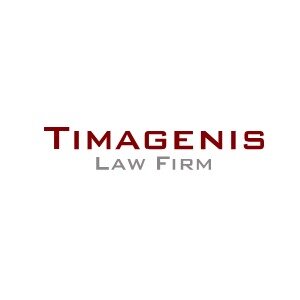Best Conveyancing Lawyers in Greece
Share your needs with us, get contacted by law firms.
Free. Takes 2 min.
Free Guide to Hiring a Real Estate Lawyer
Or refine your search by selecting a city:
List of the best lawyers in Greece
About Conveyancing Law in Greece
Conveyancing in Greece refers to the legal process involved in transferring ownership of real property from one party to another. This process includes the preparation, negotiation, and execution of necessary documents to ensure lawful and uncontested transfer. Greek property law is detailed and regulated, involving multiple authorities, public registries, and often mandatory notarial oversight. Both foreigners and Greek nationals must comply with certain legal steps to finalize a real estate transaction, making it crucial to understand how conveyancing works in Greece.
Why You May Need a Lawyer
Lawyers play a central role in Greek conveyancing. Some common situations where professional legal assistance is needed include:
- Purchasing or selling a property as a foreigner or Greek national
- Investigating property titles and confirming there are no encumbrances, liens, or disputes
- Drafting and reviewing contracts or preliminary agreements
- Guiding compliance with tax obligations and bureaucratic processes
- Acting as your representative if you are not present in Greece
- Resolving inheritance-related property issues
- Obtaining required certificates, permits, or approvals
In Greece, it is generally advisable, and often necessary, to have a lawyer involved to ensure all legal conditions are satisfied, such as accurate title registrations and settlement of legal disputes or debts attached to the property.
Local Laws Overview
The Greek conveyancing process is distinct due to specific legal requirements. Notable aspects of local law include:
- All property transfers must be completed before a notary public
- Full investigation of the property's title is mandatory, often performed by lawyers, at the local Land Registry or Cadastral Office
- Buyers must obtain a Greek Tax Identification Number for the transaction
- Proof of payment of property taxes and municipal levies is required at transfer
- A certified engineer's report is required to confirm the property is legally built and free from planning violations
- The contract of sale must be registered with the relevant Land Registry or Cadastral Office to validate ownership
- There are specific rules and restrictions for non-EU nationals regarding property acquisition in certain Greek regions
It is important to note that the notary public ensures the legality of the transaction, but each party's legal interests are best protected by their own lawyer.
Frequently Asked Questions
What is the usual process for buying property in Greece?
The process typically involves selecting the property, hiring a lawyer, obtaining a tax number, conducting title searches, arranging for contractual documents before a notary, settling taxes and fees, and registering the deed at the Land Registry or Cadastre.
Is it mandatory to have a lawyer for property transactions?
While not always legally required, it is highly recommended, especially for transactions in urban areas or involving foreign nationals, as lawyers safeguard your interests at each stage.
What taxes and fees apply when buying property?
Buyers are usually responsible for the property transfer tax, notary fees, lawyer’s fees, and Land Registry or Cadastre registration fees. Accurate rates depend on the property’s value and location.
Can foreign nationals buy property in Greece?
Yes, but some restrictions may apply to non-EU nationals in border areas or on certain islands. Each buyer must obtain a Greek tax number and may need approval from the Ministry of Defense for restricted zones.
What documents are needed to transfer property ownership?
Essential documents include identification, tax numbers, property title deeds, topography plans, an engineer’s report, tax clearance certificates, and various municipal certificates. Your lawyer will specify all needed paperwork.
How long does the conveyancing process take?
The timeline varies depending on document availability and registry schedules, but most transactions complete within a few weeks to a few months, barring complications.
What is a preliminary agreement?
A preliminary agreement is a contract outlining the terms of the sale, typically including a deposit, before the final transfer at the notary. It helps secure the deal while legal checks are completed.
What does the notary public do?
The notary public drafts and oversees the signing of the sale contract, ensures all legal requirements are met, calculates taxes and fees, and processes registration at the authorities. The notary is neutral and does not act as either party’s legal advisor.
How do I confirm the property has a clear title?
A lawyer will conduct a title search at the Land Registry or Cadastral Office to detect mortgages, encumbrances, or legal disputes that may affect the property. This is a vital step before purchase.
What happens after the property transfer is complete?
Once the contract is signed and registered, the buyer officially owns the property. Utility transfers, insurance arrangements, and tax declarations should then be handled promptly with professional guidance.
Additional Resources
The following resources can be helpful for those needing more information or assistance regarding conveyancing in Greece:
- Hellenic Cadastre (Ktimatologio) - The national property registry body
- Greek Ministry of Justice
- Hellenic Notaries Association
- Local Land Registries
- Law Societies and Bar Associations in Greece
- Local embassies or consulates, especially for foreign buyers
Many public bodies offer information, guides, and support in English and other languages, especially in tourist or expatriate areas.
Next Steps
If you are planning to buy or sell property in Greece, here are the recommended next steps:
- Research the property market in your area of interest and familiarize yourself with Greek real estate basics
- Consult a qualified Greek conveyancing lawyer for initial advice on your situation
- Arrange all personal documentation, including obtaining a Greek tax identification number if applicable
- Clarify your budget, including taxes and professional fees
- Engage a licensed engineer for the required technical and compliance checks
- Work with your lawyer to ensure all contracts and documentation are legally sound and risks are identified and managed
- Ensure all steps are followed carefully to protect your investment and ownership rights
Securing professional legal advice early in the process is the best way to ensure a successful and stress-free property transaction in Greece.
Lawzana helps you find the best lawyers and law firms in Greece through a curated and pre-screened list of qualified legal professionals. Our platform offers rankings and detailed profiles of attorneys and law firms, allowing you to compare based on practice areas, including Conveyancing, experience, and client feedback.
Each profile includes a description of the firm's areas of practice, client reviews, team members and partners, year of establishment, spoken languages, office locations, contact information, social media presence, and any published articles or resources. Most firms on our platform speak English and are experienced in both local and international legal matters.
Get a quote from top-rated law firms in Greece — quickly, securely, and without unnecessary hassle.
Disclaimer:
The information provided on this page is for general informational purposes only and does not constitute legal advice. While we strive to ensure the accuracy and relevance of the content, legal information may change over time, and interpretations of the law can vary. You should always consult with a qualified legal professional for advice specific to your situation.
We disclaim all liability for actions taken or not taken based on the content of this page. If you believe any information is incorrect or outdated, please contact us, and we will review and update it where appropriate.
Browse conveyancing law firms by city in Greece
Refine your search by selecting a city.
















